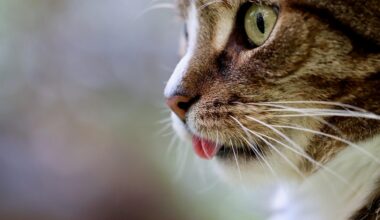Finding the Right Senior Cat for Your Family
Adopting a senior cat can be one of the most rewarding experiences for pet lovers. Senior cats often wait longer in shelters than their younger counterparts, which leads to many benefits when you choose one. Not only do you provide a loving home to a cat that truly needs you, but you also often find a companion that has already matured. Senior cats are usually already litter-trained and possess established personalities. They often enjoy the simple pleasures of life, such as basking in sunny spots and purring while cuddled up. Pick a cat whose personality matches your lifestyle, whether it’s a laid-back couch potato or a moderately active feline. It’s essential to conduct proper research into local shelters or rescues that specialize in senior cat adoptions. Many shelters also offer profiles on their senior cats. This helps in making an informed choice that aligns with your family dynamics. Additionally, don’t hesitate to consult with shelter staff who can provide valuable insights into the cat’s unique behavior and history, ensuring you and your new furry friend can thrive together.
One key aspect to consider when adopting senior cats is their health needs. As cats age, they may experience various health issues that require special attention. Before finalizing your adoption, it’s beneficial to request the cat’s medical history from the shelter. Key documents at times reveal whether they have received regular vaccinations. In addition, it’s crucial to ensure they are spayed or neutered. These steps greatly improve their overall health and prevent additional unwanted litters. Be prepared to take on potential veterinary visits for older cats, as certain health issues may arise, such as kidney problems or arthritis. Potential adopters should prioritize spending some time with a cat prior to adopting. This can help both parties to gauge compatibility. Observing the cat’s behavior can indicate how they will fit into your home. A one-on-one interaction with the new feline provides insight into their character traits and health status. After all, the relationship between a person and a pet is built on understanding and shared routines. It is essential that potential adopters ensure a seamless transition into their families.
Preparing Your Home for a Senior Cat
Creating a welcoming and safe environment for a senior cat is vital to their adjustment. Begin by decluttering your home, removing any hazardous items that could be a risk. Senior cats can sometimes struggle with mobility, so providing easy access to their essentials will help a lot. Place litter boxes, food, and water bowls in accessible locations. It’s also wise to consider placing scratching posts or pads near their areas. A cozy, quiet spot where they can retreat is beneficial too. Including various resting places throughout your home allows for comfort and security. Pay attention to temperature, as senior cats may be more sensitive to extreme changes. It’s advisable to offer warm bedding in drafty areas to keep them comfortable. Additionally, consistency in your cat’s routine can provide a sense of normalcy. Regular feeding times and a well-timed play can help manage stress and anxiety. Ensure that any family members are aware of the new addition, and involve them in caring for the cat, creating a family bond from day one.
Once a senior cat enters your home, it’s time to focus on their nutrition. A specialized diet for senior cats can enhance their health and overall well-being. Consult your veterinarian for recommendations tailored to your cat’s specific needs. Many senior cats benefit from high-protein, low-carb diets that help maintain their muscle mass while managing their weight. Additionally, consider transitioning gradually to new food rather than an abrupt change. Monitoring their eating habits is crucial, as older cats can sometimes be prone to changes in appetite. Frequent vet check-ups can also ensure their dietary choices are aligned with their health. Regular weights can assist in tracking any weight loss or gain, which is pivotal to preventing obesity or malnutrition. Furthermore, engage them with interactive play to stimulate their mental faculties. Simple toys can reignite their playful side. However, be cautious; choose toys that are safe and appropriate for senior cats, considering that they may lack the energy or agility of younger cats. Take these simple steps to keep them healthy, active, and engaged in their new surroundings.
Socializing with Your Senior Cat
Developing an effective bonding method contributes significantly to a senior cat’s adjustment. It is essential to provide a calm and welcoming environment. Slowly introducing family members or other pets, if any exist, is necessary to reduce anxiety. Each interaction should be brief yet positive, allowing for a gradual face-to-face meeting. Respect their space, giving them the freedom to explore their surroundings at their own pace. Utilize treats or toys to create a positive association with interactions. Patience is critical during this process; allow your new friend to dictate the pace. Fostering moments of engagement can show them they are safe and loved. Build routines that include brushing sessions or gentle petting, making these actions enjoyable. Senior cats often appreciate calm, quiet times and may seek companionship without being too demanding. Watch for their cues regarding care and trust; observing comfort levels will help strengthen your bond. Use soft voices and gentle approaches to foster confidence and ease fear. Soon enough, those moments will blossom into genuine affection for each other, creating a lasting companionship that enriches both your lives.
Enrichment is vital for a senior cat’s mental and physical well-being. Older cats may not be as hyperactive, but they still require stimulation and joy in their life. Incorporating various engaging activities can lead to a happier cat. Engage their senses with catnip, laser pointers, or feather wands designed for felines. Additionally, consider setting up a window perch where they can observe outside activities. The changing scenery can provide endless entertainment and promote mental stimulation. It’s essential to keep in mind that not all senior cats react the same way to different toys or stimuli. Testing various options to discover preferences can create a fun routine that fits both the cat’s and owner’s lifestyle. Moreover, puzzle feeders can challenge their intellect and encourage exercise. Offering tasty treats hidden in puzzle toys makes mealtime both stimulating and rewarding. Creating defined playtimes helps integrate their socialization and activity needs. Lastly, always monitor their reactions to activities. Being mindful of your cat’s limitations will ensure a joyful atmosphere that accommodates everyone involved while celebrating your senior cat’s life.
Caring for Health Challenges
Adopting a senior cat frequently means facing some health hurdles due to their age. Common concerns include dental issues, obesity, and arthritis, but there are many advancements in veterinary care to help manage these ailments effectively. Regular veterinary check-ups are critical for monitoring your cat’s health. They help catch any potential problems early on. Implementing preventive care is essential, as it can ensure longer, healthier lives for older felines. Additionally, keeping their weight in check improves physical mobility, boosting quality of life. Joint supplements may also assist in alleviating discomfort resulting from arthritis. It is essential to keep your home environment comfortable, such as utilizing ramps or pet stairs. Easy accessibility to food and litter boxes can ease daily challenges. Examine their dental health as well, since tooth decay can affect their ability to eat. Regular cleanings and appropriate dental care lead to healthier gums. Identifying changes in behavior through observation can provide early signs of potential issues. A comfortable, safe household enhances their overall quality of life while you enjoy the continued companionship of your senior cat.
Finally, remember that each senior cat has a unique personality shaped by their past experiences. Patience, understanding, and unconditional love are pivotal to ensuring that they feel at home in your family. As you build your bond, expect to experience their quirks and preferences. Keep in mind that post-adoption, they may require time to adjust, and some may withdraw initially. Creating a rhythm to your interactions fosters their confidence over time. Regular feedback from the vet can help guide your journey together. Also, embracing their peculiar interests can turn mundane moments into special memories. Sometimes an older cat will surprise you with newfound energy and playful antics, enriching your lives. Additionally, maintain a flexible routine that caters to their needs, evolving consistently as they age. Senior cats provide companionship in profound ways. The interaction of caring and nurturing will strengthen the bond, resulting in cherished moments together. Adopting a senior cat is an act of kindness that can fill your heart with joy while simultaneously ensuring they live their golden years in comfort and peace.


